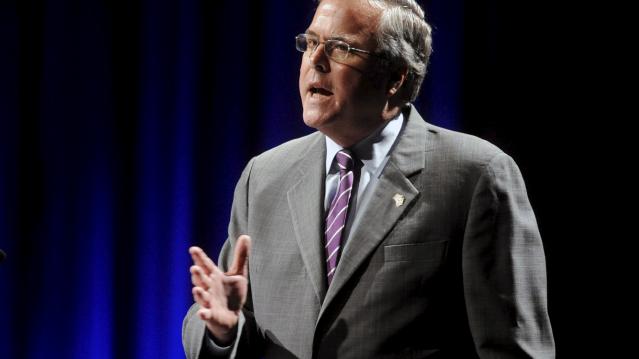Poll: Trump Tax Cuts Favor the Wealthy; Deficit Should Be Higher Priority
Trump and the GOP still have work to do if they want to convince Americans that their tax plan won’t mostly help the rich. A CBS News Nation Tracker poll released Sunday finds that 58 percent say the tax reforms being discussed favor the wealthy, while 19 percent say it treats everyone equally and 18 percent say it favors the middle class.
The poll also found that 39 percent say that cutting the deficit should be a priority, even if it means taxes stay the same. About half as many people said cutting taxes should be prioritized even if the deficit rises.
The poll, conducted by YouGov, surveyed 2,371 U.S. adults between October 11 and 13. Its margin of error is 2.5 percent.
How Big Is Your Screen? Minecraft Brings Its Game to Movie Theaters in the U.S.
The Minecraft sandbox just got a whole lot bigger.

This summer, one of the most popular games in the world may be coming to a movie theater near you. But you can play only if you’re between the ages of 7 and 17.
With over 100 million registered users, there is nothing virtual about Minecraft’s success. Microsoft paid $2.5 billion to purchase the game and its developer, Mojang, last year. This summer, startup Super League Gaming is giving young fans a chance to play the game in movie theaters. SLG has partnered with four major movie theater chains—Regal Entertainment Group, AMC Theatres, Cinemark Theatres and iPic Theaters—to bring the shared experience of a 100-minute Minecraft game to thousands of kids in 25 cities at more than 80 theaters.
For theater owners, it’s an attractive way to generate more revenue. They can sell more seats and they get to keep a larger percentage of the gross from league ticket sales than from movie ticket sales. With overall box office receipts in decline, theater owners are searching for new ways to fill theater seats. The summer of 2014 was the worst summer for movies since 1997, with a 15 percent decline of $3.9 billion from 2013. With the $204 billion opening of Jurassic World in June, theater owners are cautiously optimistic for 2015.
SLG president and co-founder Brett Morris told Fortune that “theaters want to be a destination for all entertainment, and there’s not a better next-gen entertainment option than gaming.” The summer games series taps into the kids who already spend hours playing Minecraft and watching Minecraft YouTube videos online.
After purchasing tickets online for $20 each, gamers will bring their own fully-charged laptops (which must be already loaded with Minecraft version 1.8 or above) to the movie theater. Once there, they can form teams and play the game in small groups on their laptops. They also can watch the entire playing field on the movie screen as teams play in real time.
For the kids, it’s a way to socialize—and strategize. Kids can be as loud as they want, compare builds, grab snacks, and move around inside the theater.
Plans for a fall league are already under way, with 150 theaters in 18 states signed up to participate. Each six-week league session costs $120, with gamers playing once a week. SLG is also going international, with gaming events in China and Canada.
Everyone else will have to wait for Minecraft, the movie, which is currently in development at Warner Bros.
Love Selfies? Now They Can Keep Your Credit Card Safe

MasterCard is appealing to America’s obsession with selfies in an effort to reduce credit card identity theft.
The credit card company is launching a new program that will allow consumers to approve online purchases with a facial scan. At the checkout page, you’ll be asked to take a picture of yourself using your phone instead of entering a password.
Currently, customers can stop hackers from using their credit card on the Web by setting up a “SecureCode,” which requires a password when shopping online. The password system was used in 3 billion transactions last year.
This fall MasterCard will launch a small pilot program involving 500 customers using fingerprints and facial scans. If the test is a success, the company plans on rolling it out publicly afterward. The company is also looking ahead to one day apply voice recognition technology.
To use the new selfie system, customers need to download the MasterCard phone app. Once you pay for something, a pop-up will appear asking for your authorization with either a fingerprint or facial recognition. Using facial recognition, customers stare at the phone, blink once — and bam! All done. The blink is a security measure so thieves can’t just hold up a photo of you. A fingerprint only requires a touch.
Passwords are easily forgotten, stolen or cracked, so the new system is a way to prove your identity using biometrics. Critics of the new system are uncomfortable that the photo or fingerprint a customer puts into his or her phone will transmit to the company’s computer servers. Cybersecurity experts worry the transfer of such information across devices is too big of a privacy risk.
MasterCard wasn’t the first company to develop a facial recognition app — Chinese shopping brand Alibaba demonstrated one in March, but had to postpone the technology’s launch because of security risks found by China’s central bank and police ministry.
Get Ready for Your 'Daily Glitch'—The NYSE, WSJ and United Were Just the Beginning

“Glitch” is clearly the word of the moment, after a series of pesky little technical problems forced United Airlines to ground flights, halted New York Stock Exchange trading and took down The Wall Street Journal website homepage all on the same day. If that wasn’t enough technical trouble, Seattle’s 911 system went down briefly. And a couple of NASA spacecraft also suffered “glitches” in recent days.
We deal routinely with glitches these days — a Wi-Fi connection goes down, an app freezes, a plug-in (usually Shockwave) stops responding, an email doesn’t load properly — which may help explain why, aside from lots of grumbling from delayed airline passengers, the reaction to Wednesday’s glitches was rather muted. The NYSE problems were reportedly caused by a “configuration issue” after a software update and United blamed its problem on “degraded network connectivity.” We see those issues every day, just not on as large a scale.
But that’s the problem.
At the risk of sounding like a high school term paper, let us note that the Merriam-Webster definition of glitch is “an unexpected and usually minor problem; especially: a minor problem with a machine or device (such as a computer).” The full definition describes it as a minor problem that causes a temporary setback.
Sure, Wednesday’s setbacks were all temporary. The Wall Street Journal site came back up quickly. Seattle’s 911 service was restored. Action on the NYSE itself was stopped for nearly four hours, but even then traders were still able to buy and sell NYSE-listed stocks on other exchanges. United grounded about 3,500 flights, which meant some people missed a wedding or a crucial business meeting. That will take time to sort out, but it will get sorted out.
In aggregate, though, the problems add up — and the word “glitch” only minimizes what can be much bigger, more serious issues..
Stock exchanges have suffered from a series of stoppage-causing glitches in recent years, pointing to the value of having trading spread across numerous exchanges. United’s tech breakdown “marked the latest in a series of airline delays and cancellations in the last few years that experts blame on massive, interconnected computer systems that lack sufficient staff and financial backing,” the Los Angeles Times reports. Just ask any of the roughly 400,000 United passengers whose travel plans were messed up if this was a little glitch. Or maybe check with the engineers who had to troubleshoot and rebuild the HealthCare.gov site after its glitch-laden launch.
It may be some relief that these latest outages weren’t the result of external attacks, but as sociologist Zeynep Tufecki, an assistant professor at the School of Information at the University of North Carolina, writes at The Message, “The big problem we face isn’t coordinated cyber-terrorism, it’s that software sucks. Software sucks for many reasons, all of which go deep, are entangled, and expensive to fix.”
These foul-ups are now mundane, and to some extent they may be inevitable as we rely more and more on complicated computer systems in every aspect of our lives. That’s the real issue, and it’s a lot bigger than a glitch.
Jeb Bush Wants Me to Do More What?

Yesterday, Republican hopeful Jeb Bush ticked off hard-working Americans everywhere when he said that in order to grow the economy, people had to work longer hours. Here’s the skinny:
What He Said: “My aspiration for the country--and I believe we can achieve it--is 4 percent growth as far as the eye can see. Which means we have to be a lot more productive. Workforce participation has to rise from its all-time modern lows. It means that people need to work longer hours and, through their productivity, gain more income for their families. That’s the only way we’re going to get out of this rut that we’re in.”
This Is All We Heard: “People need to work longer hours.” And “Let them eat cake.” Then we played Hall & Oates “Out of Touch” a few times.
Related: Microsoft Hangs Up on Nokia, Cuts 7,800 Jobs
Then He Talked Some More. Later Bush clarified that his remarks really were in reference to underemployment and part-time workers. His campaign cited stark statistics of falling workforce participation, which are currently at their lowest level since October 1977. It also was a dig at Obamacare, which had previously defined the work week for a full-time employee at 30 hours, causing many employers to cap work weeks at 29 hours.
Who’s right? Well, as it turns out, both are. Workforce participation in the U.S. is at 62.6 percent. The Bureau of Labor says there are 6.5 million people in the U.S. who are working part-time because they can’t find full-time employment.
But it’s also true that many Americans are already putting in longer hours, and taking fewer and shorter vacations. A recent Time cover story called out, “Save the American Vacation” and referred to us as a “no-vacation nation.” A 2014 Gallup poll claims the average work week for many Americans who work full-time is more like 47 hours (not 40), and 21 percent report they work between 50 to 59 hours per week. Another 18 percent said they work 60 hours or more. (Only the South Koreans work harder, but we really don’t want to emulate them.)
That didn’t stop Democratic rivals from hollering back. Presidential candidate Hillary Clinton Tweeted: “Anyone who believes Americans aren’t working hard enough hasn’t met enough American workers.”
So there—for now.
Which Would You Rather Have Stolen: Your Naked Photos or Your Financial Data?

Given the choice, more than half of Americans would prefer to have naked photos of themselves leaked online than have their financial information stolen, according to a new report by MasterCard.
The study finds that more than three-quarters of Americans are anxious about their financial information and social security numbers being stolen or compromised. That makes it a worry for more Americans than having their email hacked (62 percent) or their home robbed (59 percent).
Still, most Americans aren’t properly safeguarding their data. Although more than 90 percent of those surveyed said that they take precautions to protect their financial information, 46 percent rarely or never change their passwords, and 44 percent use the same password for multiple online accounts.
Related: Expert Tips to Reduce Your ID Theft Risk
The two post popular passwords found on the Internet last year were (once again) 123456 and “password,” according to a separate report by password management provider SplashData.
In addition to changing your password and using multiple, strong passwords for various accounts, consumers can protect their data by avoiding public WiFi for purchases and shopping online only on secure sites.
There’s good reason to be cautious. Last year, 2.5 times more consumers were notified that their personal information had been compromised in a data breach than in 2013, according to Javelin.
If you are worried that you have been the victim of ID theft, report it immediately to your credit card issuer, bank, and other financial institutions. Sign up for a fraud alert and check your credit reports regularly for suspicious activity.
